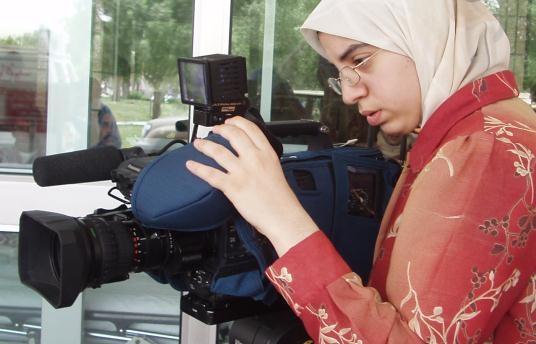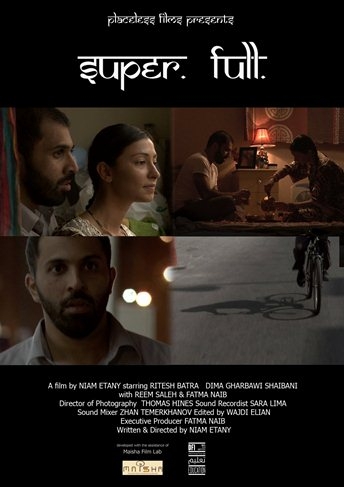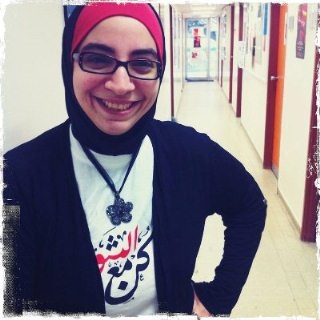People in Film: Niam Itani
May 29, 2011

I was born and grew up in Beirut during the civil war, like most of my friends. I am a proud alumna of the Lebanese American University (LAU) in Beirut, where I finished a BA in Communication Arts (Radio/TV/Film) in 2000 and an MA in Education in 2005. I am also an alumna from Hollins University in Virginia, USA where I completed an MFA in Screenwriting in 2010 – something I had wanted to do since the year 2000.
I am currently a part time faculty member at LAU where I teach Scriptwriting. The rest of my time is dedicated to my independent career in screenwriting and filmmaking. I worked for five years at the Al Jazeera Network as a Programs Producer, and that was the only official employment I had to go through. I wrote, directed, and produced several films – mostly documentaries. The ones I am most proud of are a feature documentary for Al Jazeera called ‘Rokam Al Bared’ (‘Ruins of Nahr Al Bared’), two short student narratives, and most recently my first narrative short ‘Super. Full.’.
I have written more screenplays than I can count. It is my hobby and profession. My documentary ‘A Foretold Memory’ was selected for the Al Jazeera Documentary Film Festival in 2005. My graduate student film ‘Nickelheads’ won Best Comedy at the Trebas International Student Film Awards in Toronto in 2010. My short narrative ‘Super.Full.’ won Best Screenplay during the MAISHA Screenwriting Lab in Zanzibar 2010. The film will premiere at Seattle International Film Festival on Monday, May 30 and play on June 4 at the Worldwide Short Film Festival in Toronto, Canada. I hope it also gets to play in some festivals in Europe, Asia and Africa as the festival run for it is still at its beginning.
DFI: After working with Al Jazeera Arabic for 5 years, what made you decide to remove yourself from the news?
Niam: I went to Al Jazeera to learn and to be able to pay my tuition fees for graduate school, to finish my screenwriting degree. I gave myself a deadline of five years and I am glad I was able to abide by it. I try to stay away from politics and news as much as I can, and I did that also at Al Jazeera. I am very fragile when it comes to world trouble. Most of the programmes I worked on were cultural, social, or sports related. I learned a lot from Al Jazeera but after five years it was time to get back on track. Films are what I want to do.

‘Super. Full.' movie poster.
DFI: The Doha Film Institute supported you with your film ‘Super.Full.’. Can you tell us what it is about, and how you came to make this beautiful short?
Niam: ‘Super.Full.’ is a short narrative that I first wrote as a silent film. At its core it is about a very poor couple living in a very rich city. I worked on the script for four months, writing and re-writing it with the support of MAISHA and DFI. When it won Best Screenplay at MAISHA, DFI granted us an award that helped us produce the film. DFI then gave us moral and logistic support with production staff and equipment, and continue to help now with the festival run and distribution. I don’t want to sound superficial but without DFI this film would not have seen the light of day.
DFI: You recently received a development fund from DFI. How do you see encouragement for Arab filmmakers growing within the region, and how important it is to be able to tell these stories?
Niam: To answer the second question first, I think it is vital for us to be able to tell our stories: not because we are different than other filmmakers around the globe, but because we are similar to them. Film is a platform to project this. The rise in the last five or seven years of several funds, festivals, workshops and competitions around the gulf countries particularly, and also Jordan, gives us more hope and encourages artists to go after their own “call to adventure”. Whether we make it or not, I am a firm believer in the journey, so I will leave it for others to measure our success in the years to come.
DFI: Can you tell us more about your future film projects, including the feature you are currently working on? When do you expect production to start?
Niam: My feature film ‘Shadow of a Man’ (‘Salaman ya Abi’ in Arabic) is about a young man who wants to have a peaceful life in Lebanon, a country that constantly witnesses armed conflicts. It takes place in the mountains during the 2006 summer war, when Ahmad, the best car mechanic around, finally gets a chance to fix his father’s car. But as he works on the Peugeot that is left over from 1984 and brings it back to life, tragic events start to occur and dark secrets arise. Ahmad’s legacy is shattered. His faith in his country is challenged. He is forced to make tough decisions.
It is a film about love, loss, redemption, peace and the meaning of home. On a thematic level it is a reflection of my own internal journey towards peace. On the outside it is a universal father-son story, rich with conflict and emotion. The script is now in development, which will take about six months. I still have to find a producer and financial support to take it to production. I wrote the first draft of this script in 2008 and if it makes it to the big screen seven years after that date – in 2015 – I’ll be satisfied.
DFI: What are the challenges you face being a female filmmaker in the Arab world?
Niam: There are many challenges to the career of a female filmmaker in the Arab world. On a very basic level, I had to work more than once with cameramen and male editors who did not take me seriously in the beginning. You always have to make an extra effort to prove yourself when you work in this field – I think this is a universal challenge for women in film. In the Arab world there is an extra extra mile, because people think this field is for the less fortunate: those who cannot have “better” careers, like medicine and engineering and education, or who simply did not do well at school. When I finished high school I was a bright student and many people were put off when I said I wanted to be a director. They asked if I was going to make music videos for life. Coming from a conservative family and wearing the Hijab made it look even odder. But I love the fact that artists are different inside and out, and this eventually served me well!

Filmmaker - Niam Itani.
DFI: What aspect of filmmaking do you feel inclined towards?
Niam: In the filmmaking process I am passionate about screenwriting, mostly because I am a very introverted person – an INFJ (a personality type classed as introversion, intuition, feeling, judging). I prefer doing tasks that can be done alone; I express myself way better in writing than in speaking, and I am good at creating characters and understanding human behaviour. My love for filmmaking is equally immense, but the fact that I have to be on set and interact with many people in person scares me, believe it or not. When I write scripts I am at home, wherever I am.
DFI: Would you write films for others to direct? Where do you get the inspiration for your work?
Niam: Absolutely. I would love to write for other directors. In an ideal life, I would direct only every once in a while, just to satisfy my thirst to create visual beauty, otherwise I would have too many screenplays to direct in a lifetime! So yes, I am all into writing for other directors. Inspiration is everywhere around us. Three things inspire me particularly: I read lots of articles and I make sure to be constantly reading at least one work of fiction; I always observe human behaviour and watch everything around me, down to the tiniest details; and I daydream and think about humanity a lot, then write it down in my blog or journal. It helps me keep my mind clear and keep writers block away.
DFI: How do you see the future of filmmaking in the region? Is there hope?
Niam: Definitely. When I get a rejection note from a regional competition or festival for a script or a film I feel sad, but I also feel good. It reminds me that there are other people out there who are as eager and passionate about their stories, about filmmaking and screenwriting as I am. Wherever there is passion there is hope. The Arab world is rich with young people who have suffered enough to become great artists.
DFI: What would you say to those who want to become scriptwriters? What are the steps you would recommend they follow?
Niam: A teacher at school used to tell us that if we want to become writers we have to read a lot. As a teacher now, I tell my students that if they want to become writers they have to write a lot. There are no specific steps to becoming a screenwriter, but you definitely will never be one if you do not actually glue yourself to your chair and write and rewrite. My motto is “the amateur writes, the professional rewrites”.
DFI: What does filmmaking mean to you?
Niam: For me, filmmaking has transcended meaning something. It is an obsession that I willingly and happily surrendered to.
DFI: What film has inspired you the most, and why?
Niam: It has to be Andrei Tarkovsky’s ‘Mirror’. When I watched ‘Mirror’ for the first time, in 1998, I almost stopped the tape more than once. It didn’t seem to make sense. But it was so mysteriously beautiful that it made me keep going. By the time ‘Mirror’ ended I knew that Tarkovsky would be my mentor in absentia. He paints on film.
DFI: Why do you want to make films?
Niam: I can list a thousand reasons why I want to make films. They could include grave statements like growing up during a civil war-torn country and wanting to tell the world about the value of things taken for granted sometimes, like peace and love and justice. And it wouldn’t be a lie. But the truth is, when I write screenplays and make films I feel “spiritually high”. There is a very simple, and possibly selfish, reason why I want to make films: because it makes me happy.